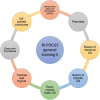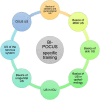Development and implementation of a comprehensive ultrasound curriculum for medical students: The Bonn internship point-of-care-ultrasound curriculum (BI-POCUS)
- PMID: 37035342
- PMCID: PMC10080124
- DOI: 10.3389/fmed.2023.1072326
Development and implementation of a comprehensive ultrasound curriculum for medical students: The Bonn internship point-of-care-ultrasound curriculum (BI-POCUS)
Abstract
Background: Point-of-care ultrasound (POCUS) is rapidly gaining ground within different areas of applications. Despite the high and increasing relevance of ultrasound, the availability of structured training programs in medical schools is still limited. Therefore, many doctors keep acquiring all their ultrasound skills throughout their postgraduate training. As a result, new residents lack theoretical and practical ultrasound abilities that are critical in everyday clinical practice. In order to improve this, we created and implemented a complete ultrasound curriculum for all medical students throughout their internship year that focuses on hands-on abilities in ultrasound imaging.
Methods: We used Kern's six-step model of curricular development comprising (1) problem identification and general needs assessment, (2) needs assessment of the targeted learners, (3) goals and objectives, (4) educational strategies, (5) implementation, and (6) evaluation and feedback by board-certified ultrasound experts. A two rounds Delphi process with multilevel, self-completed questionnaires and individual using a 9-point Likert scale and free text comments was used to identify learning objectives and reach agreement on the content of the curriculum.
Results: The curriculum developed is aimed at students with no or little experience in their internship year and will be taught as part of their weekly-based internship training courses consisting of 2 hours of theory and 3 hours of practical training. The training will be conducted within a modular framework focusing on the key requirements of POCUS with increasing levels of complexity in accordance with the recommendations of the German Society for Ultrasound in Medicine (DEGUM), the European Federation of Societies for ultrasound in Medicine and Biology (EFSUMB) and the World Federation for ultrasound in Medicine and Biology (WFUMB). A longitudinal e-learning system will be implemented in addition to the practical and theoretical teaching units to track and examine the progress of the students.
Conclusion: Early integration of ultrasound training into medical education as part of a structured and standardized broad ultrasound curriculum enables medical students to acquire basic skills and apply them practically. Fundamental scanning skills are acquired by hands-on exercises in small, supervised groups as part of BI-POCUS. BI-POCUS therefore provides an excellent opportunity to improve the clinical skills of future physicians. More research is needed to analyze the learning outcomes for medical students and the improvement of the patient's outcome by establishing such an ultrasound curriculum.
Keywords: curriculum; development; medical students; point-of-care-ultrasound; ultrasound curriculum.
Copyright © 2023 Recker, Schäfer, Holzgreve, Brossart and Petzinna.
Conflict of interest statement
The authors declare that the research was conducted in the absence of any commercial or financial relationships that could be construed as a potential conflict of interest.
Figures






References
-
- Heinzow HS, Friederichs H, Lenz P, Schmedt A, Becker JC, Hengst K, et al. Teaching ultrasound in a curricular course according to certified EFSUMB standards during undergraduate medical education: a prospective study. BMC Med Educ. (2013) 13:84. doi: 10.1186/1472-6920-13-84, PMID: - DOI - PMC - PubMed
LinkOut - more resources
Full Text Sources
Research Materials

